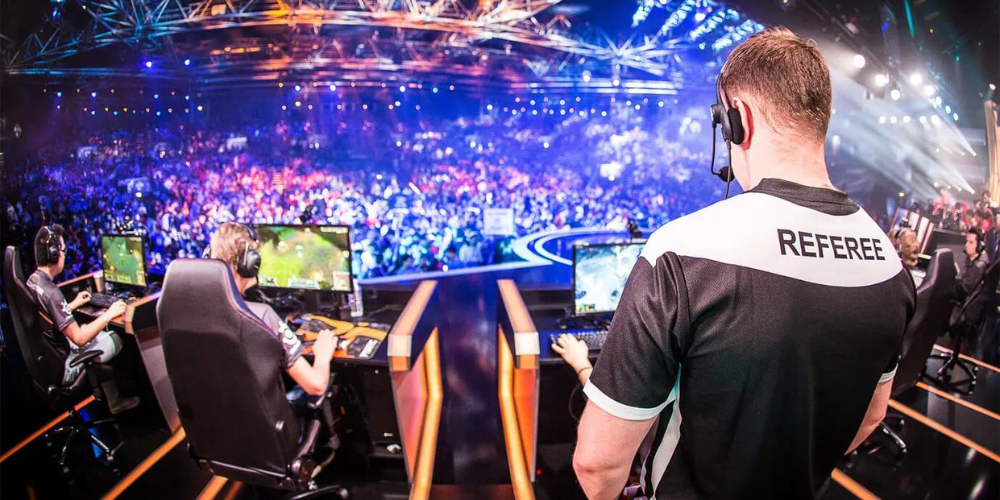
Esports, short for electronic sports, refers to organized, competitive video gaming that serves as a thrilling and rapidly evolving facet of the modern entertainment landscape. Players from around the world participate in intense competitions or tournaments, either individually or in teams, engaging across a myriad of gaming genres such as first-person shooters, strategy games, and sports simulators.
These competitions often draw vast audiences both online and in packed arenas, showcasing high levels of skill, strategy, and teamwork. With legions of passionate enthusiasts tuning in from across the globe, live-streaming platforms like Twitch have become hubs for real-time gaming action and commentary. Tailored sponsorships from major brands further fuel this burgeoning industry, providing financial support that helps players and teams flourish. Through these dynamic elements, esports has swiftly transitioned from a specialized pastime to a global phenomenon with cultural significance rivaling traditional sports.
The Birth of Esports
The fascinating origins of esports can be traced back to the early 1970s, marking the inception of competitive video gaming. The first known video game competition occurred in 1972 at Stanford University, a prestigious academic institution renowned for fostering innovation and technological advancement. During this pioneering event, enthusiastic students showcased their skills by competing in the iconic game "Spacewar," one of the earliest computer-based games that had captured imaginations since its creation.
As interest in video gaming continued to grow, by the 1980s, video game tournaments began to gain significant momentum and expand their reach. This era saw events like the Space Invaders Championship, which was meticulously organized by Atari—a leading force in the gaming industry at that time. This championship event was particularly notable because it attracted thousands of eager participants from various backgrounds, all united by their passion for video gaming.
These early competitions laid the groundwork for what would eventually become the global phenomenon of esports, evolving into a professional and widely recognized form of entertainment and competition worldwide.
Arcade Era and Broadband Internet

The 1980s and 1990s marked a transformative period in the world of gaming, characterized by the explosive rise of arcade gaming and the dawn of home consoles. Arcades became social hubs where enthusiasts gathered to test their skills against each other on machines featuring now-iconic games. Meanwhile, home consoles brought the experience into living rooms, allowing players to enjoy longer gaming sessions at their convenience. During these decades, competitive gaming began to gain substantial traction, spurred forward significantly by the popularity of fighting games like "Street Fighter" and "Mortal Kombat," as well as first-person shooters that pushed the boundaries of immersive gameplay.
As technology advanced and high-speed internet became increasingly accessible in the closing years of the 20th century, fresh opportunities for competitive gaming emerged. Players were no longer restricted to local networks or isolated single-player experiences; instead, they could challenge each other in real-time matches across vast distances. This connectivity revolutionized competitive gaming and laid the groundwork for what would become a global phenomenon.
Multiplayer online games such as "Quake" and "StarCraft" were pioneers during this era, offering dynamic and engaging platforms where players could compete directly with one another over the internet. These games set new standards for skill-based competition and community engagement. They played a pivotal role in shaping organized esports leagues—structured environments where players could compete professionally with widespread audience appeal.
This period was instrumental in transitioning video games from casual pastimes to serious competitions with dedicated followings. It heralded an exciting future for esports, transforming how people interacted with games and paving the way for today's vibrant, competitive gaming landscape.
The Emergence of Professional Leagues
In the early 2000s, esports began to professionalize with leagues such as the Korean e-Sports Association (KeSPA) and Major League Gaming (M.L.G.) in North America. Tournaments with significant prize pools and live audiences began to emerge. The rise of games like "Counter-Strike" and "Warcraft III" also contributed to growing viewership and higher stakes, leading to the involvement of sponsors and media companies.
The Streaming Revolution
The introduction of live streaming platforms in the early 2010s, particularly Twitch, revolutionized esports. Real-time streaming enabled players to reach global audiences, interact with fans, and build personal brands. This era saw the emergence of globally recognized esports celebrities and the expansion of major tournaments like The International for "Dota 2" and the LoL World Championship.
Institutional Recognition and Mainstream Success

In recent years, esports have gained further legitimacy with institutional recognition. The inclusion of esports in events like the Asian Games and the consideration for the Olympics reflect its mainstream acceptance. Educational institutions also offer scholarships for esports athletes, and dedicated esports arenas are being constructed. The COVID-19 pandemic catalyzed the expansion of the industry when conventional sports events came to a standstill, resulting in a surge of new audience interest.
Prospects for Development
Looking ahead, the future of esports is rife with possibilities. Emerging innovations such as virtual reality (VR) and augmented reality (AR) have the potential to revolutionize the gaming landscape, offering a deeply engaging and enveloping experience. The growing investment from media companies, traditional sports organizations, and venture capital will likely drive innovation and expansion. Esports also pave the way for younger generations to explore career opportunities beyond playing, including roles in game development, broadcasting, and event management.
Bottom Line
Esports has undergone a remarkable transformation since its modest inception in the 1970s, blossoming into an international sensation that captivates millions. Originally a niche hobby confined to small gatherings and local competitions, it has now exploded onto the global stage with breathtaking speed. Technological advancements such as high-speed internet, sophisticated gaming platforms, and virtual reality have revolutionized the way we engage with competitive gaming. These innovations are complemented by increasing audience engagement through live streaming platforms like Twitch and YouTube Gaming, allowing fans from around the world to participate in real time.
Additionally, growing institutional recognition from educational institutions offering esports programs and major corporations sponsoring tournaments underscores the mainstream acceptance of competitive gaming. This convergence of factors indicates that esports is poised for even more significant growth in the coming years.
Whether you are a player aiming to go pro, a dedicated fan engrossed in watching intense battles unfold, or an industry professional seeking new opportunities within this dynamic field, the world of esports promises excitement and inclusion for all. It is solidifying its place as not just a subculture but a cornerstone of modern entertainment that continues to break boundaries and set new standards.